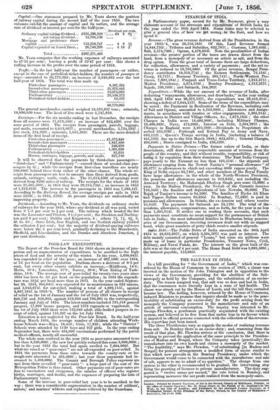SALT-TAX IN INDIA.
In a bill providing for "the Government of India," which was con- sidered by the House of -Commons in the session. of 1853, a clause was inserted on the motion of Sir John Pakington and in opposition to the views of the Government, providing for the abolition of the Salt- monopoly as held by the Company, and the substitution of an excise- duty. The reason assigned was, that salt was so dear and bad in India, that the consumers were literally kept in a state of bad health. The clause was struck out by the House of Lords, and the bill thus curtailed became law. The feeling, however, evinced by the House of Commons, induced Ministers to promise that inquiry-should be made as to the prac- ticability of substituting an excise-duty for the profit arising from the monopoly the Company possessed in the manufacture and sale- of an article of universal consumption. The inquiry was intrusted to Mr. George Plowden, a gentleman practically acquainted with the existing system, and believed to be free from that undue bias in its favour which is imputed to official persons connected with the collection of the revenue. His report has just been issued.
The three Presidencies vary as regards the modes of realizing revenue from salt. In Bombay there is an excise-duty; and, reasoning from the result of that plan, Mr. Plowden arrives at the conclusion, that there is nothing to prevent the application of the same principle to the Presiden- cies of Madras and Bengal, where the Company takes (practically) the- manufacture into its own hands and claims a monopoly of the market. "The feasibility," says Mr. Plowden, "of substituting [in Madras and Bengal] for present arrangements a modified form of excise similar to that which now prevails in the Bombay Presidency, under which the Government would cease to be connected with the manufacture and sale of salt, appears to me to admit of no question." The change from one system to the other is recommended to be gradual, the intervening step being the granting of licences to private manufacturers. The duty sug- gested is ` twelve annas per maund," the rate levied in Bombay, and representing moreover the net profit realized from the monopoly-sales..


































 Previous page
Previous page